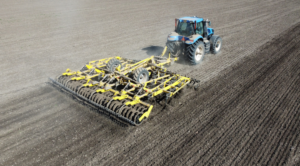
German Finance Minister and Vice Chancellor Lars Klingbeil arrived in Kyiv on an unannounced visit and said that Russian President Vladimir Putin must understand that Germany’s support for Ukraine remains unwavering, Reuters reports.
“Putin should have no illusions that Germany’s support for Ukraine could waver,” Klingbeil said.
“On the contrary: we remain Ukraine’s second-largest supporter in the world and the largest in Europe. Ukraine can continue to count on Germany,” he added.
Klingbeil called on Putin to show interest in the peace process in the bloodiest war in Europe in the last 80 years, which began in February 2022. He noted that Ukraine must participate in the negotiations and that a ceasefire and reliable security guarantees are necessary for a lasting peace. “To this end, we are coordinating closely at the international level,” the minister said.

The Relocation project has analyzed and created a brief overview of the state of the office real estate market in Rome in the first half of 2025. Rome, while remaining the administrative and cultural center of Italy, is gradually strengthening its position as a business hub. However, the office real estate market here is traditionally different from Milan, the country’s main financial center: investor and tenant activity is lower, and the supply of modern offices is limited.
In the first half of 2025, the average rental rate for Class A offices in central Rome (EUR, Prati, and the historic center) was €31–34 per square meter per month, approximately 2% higher than last year.
Outside the center, in the Tiburtina, San Giovanni, and GRA areas, rates remain at €18–24 per square meter.
According to Cushman & Wakefield consultants, demand is primarily driven by government agencies, diplomatic missions, and companies in the energy and services sectors, while demand from international IT companies in Rome is significantly lower than in Milan.
The average purchase price of office real estate in Rome in 2025 ranges from €3,600 to €4,200 per square meter in central areas, while in the suburbs (EUR periphery, Aurelio, Appia Nuova), prices range from €2,000 to €2,600 per sq. m.
Investors are cautious: according to BNP Paribas Real Estate, investment in Rome’s office segment in the first six months of 2025 amounted to around €730 million, 8% less than a year earlier. The reason is a lack of new projects and high competition for quality properties.
Analysts at JLL Italy note that there is still strong interest in properties with improved energy efficiency in Rome: in 2025, almost 40% of transactions involved buildings with environmental certification. However, the supply of such offices is extremely limited.
CBRE Italy emphasizes that a significant portion of Rome’s offices are in need of modernization, which is holding back price growth. Interest in renovating old administrative buildings into modern offices remains, but the process is slower than in Milan.
In the second half of 2025, a moderate increase in rental rates is expected in the premium segment (up to +2-3%), especially in the EUR district, where large business centers and government agencies are concentrated. According to Knight Frank’s forecasts, sales prices will remain relatively stable, with possible growth in central areas due to a shortage of high-quality properties.
The medium-term outlook for Rome is linked to the development of redevelopment projects and growing interest in flexible office spaces. However, according to experts, the Italian capital will lag behind Milan in terms of growth in the coming years, with Milan remaining the main driver of the country’s office market.

The Relocation project has analyzed and produced a brief overview of the Madrid office real estate market in the first half of 2025. In the first half of 2025, Madrid confirmed its status as one of Southern Europe’s key business centers, remaining an attractive market for investors and tenants. Despite high inflation in the eurozone and ongoing geopolitical risks, the city’s office real estate market is showing moderate growth and maintaining a high level of activity in the premium segment.
The average rental rate for Class A offices in Madrid’s central business district (CBD) in June 2025 was €36-39 per sq. m per month, 3-4% higher than in the same period last year. In areas outside the CBD, including the Atocha and Chamartín districts, rates remain between €22 and €28 per sq. m.
The growth in rentals is mainly due to a shortage of high-quality modern space and increased demand from international companies in the IT, consulting, and finance sectors.
The average purchase price of office real estate in Madrid in the first half of 2025 was €4,200–4,800 per sq. m in central areas. In suburban areas (Alcobendas, Las Rosas, San Sebastián de los Reyes), prices range from €2,200 to €2,800 per sq m.
Deals with investment funds and REITs remain a key driver: in the first half of the year, several large office building renovation projects entered the market, and investment in the sector is estimated at €1.6–1.8 billion, 12% more than in the same period in 2024.
According to CBRE Spain analysts, companies are increasingly abandoning old spaces in favor of offices with energy efficiency certification (BREEAM, LEED). The share of such spaces in the transaction structure reached 45%, indicating growing interest in sustainable development.
Jones Lang LaSalle (JLL) notes that demand for coworking spaces and flexible office solutions in Madrid has grown by 15% compared to last year. This format is particularly popular among startups and branches of international corporations expanding their presence in Spain.
Office rental rates in Madrid are expected to continue their moderate growth of 2–3% in the second half of 2025, especially in the premium segment. According to Knight Frank experts, purchase prices will fluctuate within current levels, but investor interest will remain strong thanks to stable demand and limited supply of new space.
In the medium term, the Madrid market will remain a benchmark for investors in Southern Europe: its combination of high quality of life, developed infrastructure, and growing number of international companies makes it one of the most resilient office markets in the region.
Source: http://relocation.com.ua/madrid-office-real-estate-market-results-for-the-first-half-of-2025/

In the first half of 2025, the private FUIB increased its total assets by 3.8% to UAH 203.2 billion and became the fifth largest bank in Ukraine in terms of this indicator, while state-owned Ukrgasbank, whose total assets decreased by 11.5% to UAH 189.2 billion, fell to sixth place, according to data published by the National Bank of Ukraine on its website.
According to the data, PrivatBank remained Ukraine’s largest bank in terms of total assets by a significant margin in the middle of this year, with UAH 975.3 billion, which is 1.9% more than at the beginning of the year.
It is followed by two other state-owned banks: Oschadbank, whose assets decreased by 0.5% to UAH 460.2 billion, and Ukreximbank, which increased them by 1% to UAH 318.6 billion.
In fourth place is the largest bank with foreign capital, Raiffeisen Bank, which increased its total assets by 6.7% to UAH 252.2 billion in the first half of the year.
The main change in the top five was the entry of OTP Bank, which increased its total assets by 6.2% to UAH 128.3 billion, while Credit Agricole Bank increased its assets by only 0.5% and ranked 11th in the overall ranking of banks by this indicator with UAH 123.2 billion.
Ukrsibbank ranked seventh in terms of total assets as of mid-year, increasing them by 1.5% to UAH 176.0 billion, but now it is closely followed by Universal Bank (mono) with UAH 173.1 billion, which managed to increase its assets by 12.1% in just six months.
Finally, in ninth place is the nationalized Sens Bank, whose assets grew by 5.5% in six months to UAH 153.1 billion.
The full version is published in the agency’s economic reports.

Average food prices in Ukraine in July 2025 increased by 2.8% compared to January, with rye flour and pork leading the way, rising by 29.9% and 26.1% respectively, according to the State Statistics Service (Derzhstat).
According to the agency, beef rose by 12.5% to 178.75 UAH/kg, pork by 26.1% to 140.29 UAH/kg, and poultry by 19.9% to 89.33 UAH/kg during the reporting period.
Meat products lag slightly behind in terms of price increases. Cooked sausages, sausages, and frankfurters rose in price by 9.3% over seven months and cost an average of 143.9 UAH/kg, while semi-smoked sausages in July could be purchased for an average of 181.79 UAH/kg, which is 7.4% more than in January.
Unrefined sunflower oil rose in price by 1.5% to 47.09 UAH/kg, and refined sunflower oil rose by 3.6% to 57.77 UAH/kg.
Sugar rose in price by 6.3% over the first seven months of this year and currently costs 21.49 UAH/kg.
Wheat and wheat-rye flour rose in price by 2.6% in July compared to January and costs 12.81 thousand UAH/t, while rye is hitting record highs, rising by 29.9% to 13.68 thousand UAH/t.
Accordingly, wheat bread rose in price by 5.1% to 35.51 UAH/kg, and rye-wheat bread by 7.2% to 33.68 UAH/kg. Prices for rye bread rose by 13.8% over seven months, reaching 50.63 UAH/kg. Gingerbread, cookies, and waffles added 6.9% in price and cost an average of 85.96 UAH/kg. The slowest growth in this product category was seen in pasta and noodles, which rose by 1.5% to 25.94 UAH/kg.
Buckwheat fell in price by 3.2% over the first seven months of this year, to UAH 23.72/kg, and millet by 2.4%, to UAH 15.63/kg.
From January to July inclusive, milk (by 4.8%, to 33.4 UAH/kg), butter (by 0.8%, to 307.41 UAH/kg), hard cheese (by 2.6%, to 226.83 UAH/kg), sour cream (by 1.1%, to 99.11 UAH/kg). At the same time, skimmed milk powder rose by 4.8% to 103.04 UAH/kg, and kefir rose by 1.2% to 38.77 UAH/kg.
In the alcoholic beverages segment, from January to July, denatured alcohol rose in price by 7.2% and costs 330.05 UAH/liter, beer rose by 3.9% to 31.26 UAH/liter, while brandy fell in price by 0.1% to 146.89 UAH/liter, and vodka fell by 2.6% to 76.3 UAH/liter.
Non-alcoholic beverages rose in price by 6.4% over seven months, to 21.65 UAH/liter.
Tomato juice remains the most affordable for Ukrainian consumers. In July 2025, it costs 40.53 UAH/liter, which is 2.4% more than in January, while orange juice rose in price by 9.2% and can be purchased for 61.27 UAH/liter. Apple juice became the most expensive at 71.16 UAH/liter, which is 7.6% more than at the beginning of 2025.

As part of its technology upgrade, the Agrotrade agricultural holding has purchased two modern Horsch Focus 6.35 TD seed drills, which are already working in the fields sowing winter rapeseed using the direct method, the agricultural holding’s press service reported on Facebook.
The agricultural holding noted that the purchase was made possible thanks to a partnership with OTP Leasing Ukraine. As part of the cooperation, Agrotrade received almost UAH 15 million in lease financing, of which about UAH 1.5 million is a grant under the Eligible Clean Energy Solutions program, which supports companies focused on the use of clean energy.
“The renewal of our technical fleet is part of a strategy to transform the technological core of our agribusiness. We are gradually moving towards more technological and efficient production, introducing new technological solutions while maintaining stability at our clusters, some of which are located in frontline areas. Such investments, together with the strengthening of the agricultural department’s management model, confirm our ability to systematically transform the company in difficult conditions and lay the foundation for future success together with our partners,” said Serhii Nechyporuk, CEO of Agrotrade.
The agricultural holding added that this is another step in the implementation of the company’s systematic change strategy. In the spring, Agrotrade purchased two Fendt 942 Vario tractors and two Fendt MOMENTUM 16 seeders with innovative Precision Planting solutions.
The Agrotrade group of companies is a vertically integrated holding company covering the entire agricultural cycle (production, processing, storage, and trade of agricultural products). It cultivates over 70,000 hectares of land in the Chernihiv, Sumy, Poltava, and Kharkiv regions. Its main crops are sunflower, corn, winter wheat, soybeans, and rapeseed. It has its own network of elevators with a total storage capacity of 570,000 tons.
The group also produces hybrid seeds for corn, sunflower, barley, and winter wheat. In 2014, a seed plant with a capacity of 20,000 tons of seeds per year was built on the basis of the Kolos seed farm (Kharkiv region). In 2018, Agrotrade launched its own brand, Agroseeds.
The founder of Agrotrade is Vsevolod Kozhemyako.